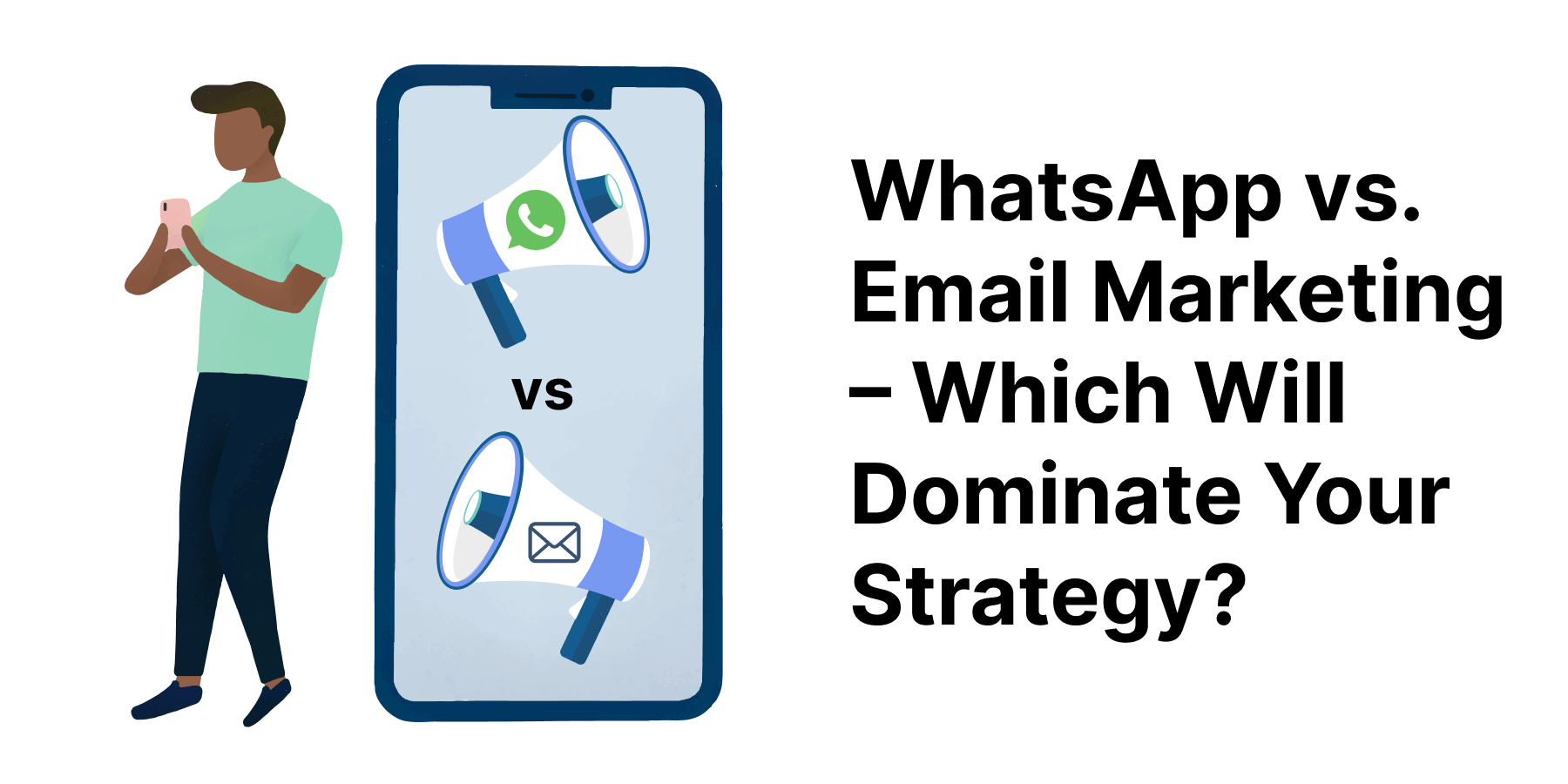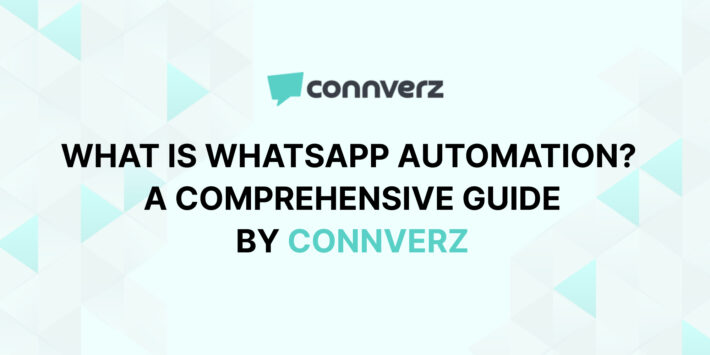WhatsApp vs. Email Marketing – Which Will Dominate Your Strategy?

Explore the strengths of Email Marketing and WhatsApp Marketing in our insightful discussion. From WhatsApp’s instant intimacy to email’s personalized depth, learn how to leverage both for optimal results. Join us in discovering the power of a balanced approach in driving engagement and nurturing lasting customer relationships
Businesses are keen on using various communication channels to connect better with their target audiences. Among these, email and WhatsApp have emerged as popular platforms for conversations.
Email Marketing has stood the test of time as a potent strategy in the digital marketing realm. Its adaptability and effectiveness consistently drive sales and boost brand recognition.
However, the entrance of WhatsApp into the arena has sparked a debate between WhatsApp and email marketing. Marketers favor WhatsApp for its impressive 99% open rate, and customers appreciate its speed and appeal, making it a viable alternative to traditional email marketing.
So, in the WhatsApp vs. Email Marketing showdown, who comes out on top? Which channel proves to be more effective?
In this article, we’ll delve into the functionality of both platforms to help you determine which aligns better with your business objectives or marketing goals.
Email Marketing: Understanding Its Significance
Email marketing is a strategy where businesses send personalized messages, promotional updates, and valuable content via email to engage with their target audience. These emails serve as effective tools in fostering relationships with both existing and potential customers, encouraging various actions like making purchases or signing up for events.
While email marketing has been a cornerstone of digital marketing strategies, recent trends show a decline in email open rates, dropping as low as 20%. Despite crafting engaging content, low open rates indicate diminishing effectiveness.
Today, people primarily check their emails for business-related matters, such as verifying OTPs or conducting email verifications, rather than engaging with promotional content. The impersonal nature of emails often fails to sway decision-making among users.
This is where WhatsApp Marketing steps in!
WhatsApp Marketing: Understanding Its Importance
WhatsApp marketing involves leveraging the WhatsApp Business platform to establish connections with customers, share promotional content, provide customer support, and engage in personalized communication. It allows businesses to reach out to a large audience through broadcasts or engage in one-on-one conversations.
One of the key advantages of WhatsApp marketing is its direct, instant, and intimate nature, facilitating direct interaction with the audience.
To illustrate the potential of WhatsApp marketing, consider Unilever’s 2019 campaign in Brazil. Dubbed “I will bring you back your beloved clothes,” the campaign aimed to promote their new fabric softener. Unilever strategically placed posters and billboards across Sao Paulo, each displaying a WhatsApp number. When people messaged the number, they interacted with a chatbot named ‘MadameBot,’ which provided clothing care tips, introduced new products through audio messages, videos, and memes, and offered a generous 50% discount on the fabric softener with free shipping upon completing the chat.
The results were remarkable: Unilever saw a 14x increase in sales, received 290,000 WhatsApp messages, and gained 12,000 new customers.
WhatsApp marketing’s success is attributed to its widespread usage and high engagement rates. With over two billion active users worldwide, WhatsApp offers a vast potential audience. Its real-time communication capabilities enable quick responses and immediate customer engagement. Businesses can utilize features like groups, broadcast lists, and chatbots to streamline interactions and provide timely support. Additionally, WhatsApp allows sharing rich media content like images, videos, and documents, enhancing the user experience.
To embark on WhatsApp marketing, businesses can utilize platforms like Connverz, which provides WhatsApp Business API-based solutions. Connverz facilitates seamless communication with users, automates notifications, ensures WhatsApp Green Tick verification, runs Click to WhatsApp Ads, sends Catalogues, collects payments within WhatsApp, and executes retargeting campaigns effectively.
Distinguishing Between Email and WhatsApp Marketing
When it comes to choosing between WhatsApp vs. email marketing, understanding the disparities between the two channels is crucial for determining the best fit for your business needs.
Open Rate:
- WhatsApp boasts an impressive open rate of 99%, thanks to its quick and personal nature that encourages immediate interaction. In contrast, email marketing faces challenges such as cluttered inboxes and spam, resulting in a lower open rate of around 21.33%.
Click-Through Rate:
- WhatsApp enjoys a higher click-through and conversion rate of 45-60%, attributed to its personalized approach, instant responses, and direct communication. Email recipients, however, tend to hesitate clicking on links due to security concerns or unfamiliarity, leading to click-through rates of about 2-5%.
Junk & Spam:
- While emails are prone to being marked as junk or spam, WhatsApp messages do not face such issues. Additionally, WhatsApp’s features like double-tick and blue-tick indicate message delivery and read status, providing more transparency.
Resource Dependence:
- Email marketing demands significant effort in design and content creation, whereas WhatsApp marketing is more casual and requires fewer resources. WhatsApp also allows for sharing various content types without worrying about file size limitations, making it more flexible.
User Responsiveness:
- With an average user spending 40 minutes daily on WhatsApp, messages on this platform receive almost instant responses. Conversely, emails often receive lower responsiveness, as they are primarily opened for OTP verifications or business-related matters.
While email marketing remains relevant with 82% of marketers worldwide still utilizing it, WhatsApp marketing offers distinct advantages in terms of open rates, click-through rates, and user responsiveness. Ultimately, the choice between the two depends on your business objectives and target audience preferences.
Deciding between Email Marketing and WhatsApp Marketing: Identifying the Best Fit for Your Business
Email marketing and WhatsApp marketing both offer unique advantages for engaging with consumers and driving brand growth. While WhatsApp provides quick, intimate, and resource-efficient communication, email marketing delivers segmented, personalized content and offers a substantial return on investment. Additionally, email marketing allows for email address verification to prevent undelivered messages or spam issues.
The decision between WhatsApp vs. email marketing depends on your business’s nature and goals. However, it doesn’t necessarily mean you have to pick one over the other. Combining both channels can yield the best results.
Let’s consider a local restaurant looking to enhance its customer outreach. The restaurant could integrate a convenient click-to-chat WhatsApp button on its website using Connverz. When website visitors click on this button, the restaurant can offer immediate deals, like a lunch special, to attract customers on short notice through WhatsApp. This approach facilitates quick responses and instant engagement.
Meanwhile, the restaurant can utilize email marketing to share stories, recipes, and updates with customers interested in deeper connections. Email’s capability to provide detailed content makes it suitable for nurturing long-term relationships.
In essence, combining WhatsApp and email marketing in the restaurant’s strategy can prove highly effective. WhatsApp grabs attention quickly for immediate deals, while email marketing builds stronger, ongoing connections with customers over time.
Wrapping Up: Finding Balance in WhatsApp and Email Marketing
As we’ve explored, both WhatsApp and email possess unique strengths. WhatsApp shines in its immediacy and intimacy, while email excels in delivering personalized, in-depth content.
In the WhatsApp vs. email marketing debate, selecting the right platform hinges on your company’s nature and objectives. However, it’s not about picking one over the other.
For optimal outcomes, why not harness the strengths of both platforms? Embracing a balanced approach guarantees swift engagement and fosters long-term relationships, laying the foundation for a resilient marketing strategy.



